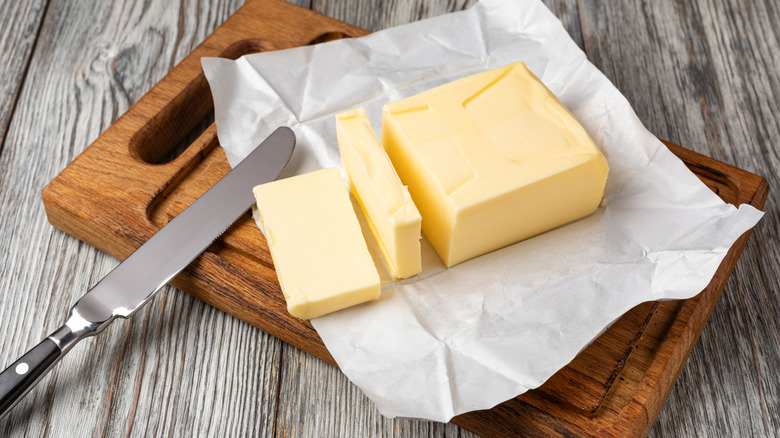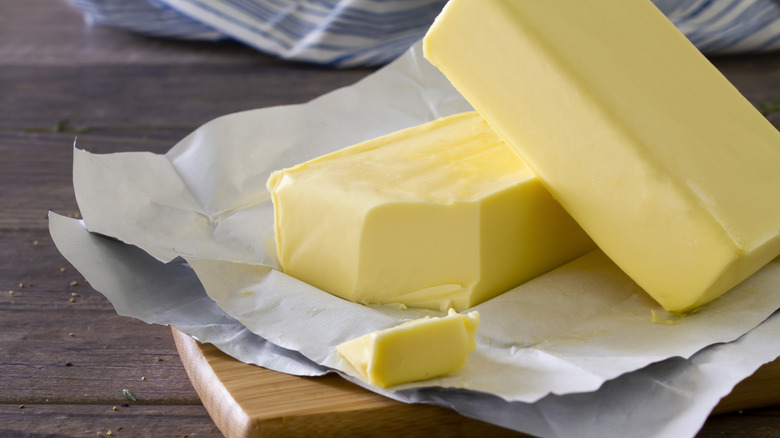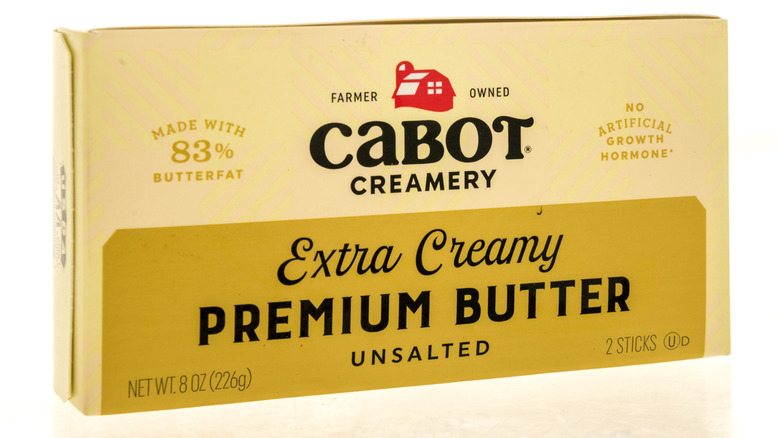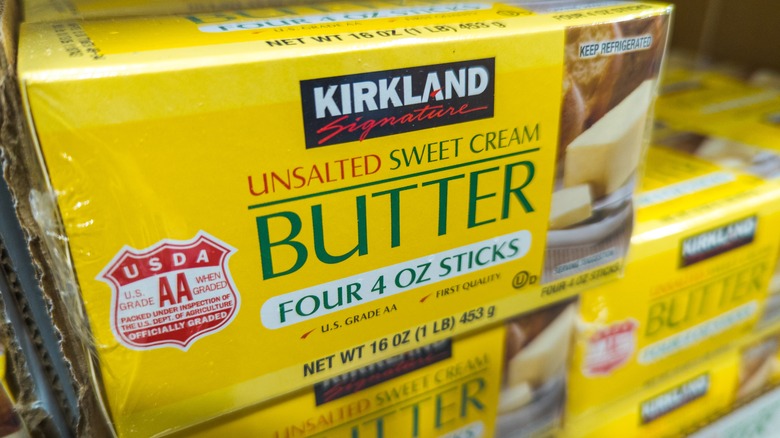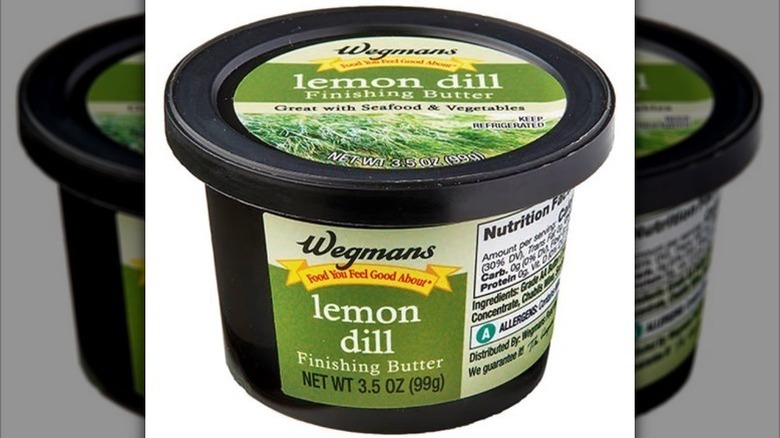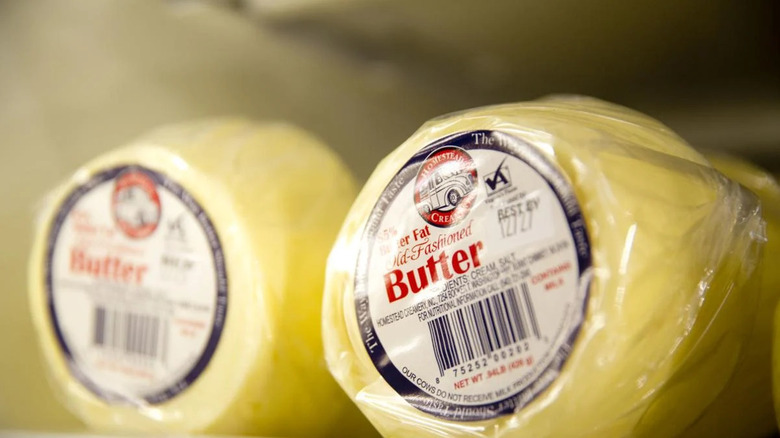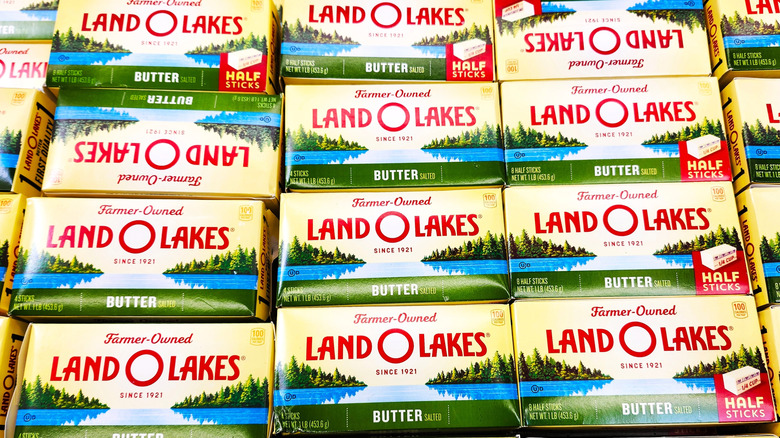7 Of The Worst Butter Recalls In The US
Butter is an absolute staple in many American kitchens. Eaten as is or cooked within so many dishes for any meal of the day, it's a product that people often buy extremely regularly and without second thought. However, there have been several extremely dangerous recalls in the past several years. While many consumers think that mass-produced products like butter have been screened over and over for safety, there are still instances where things like bacteria, physical contaminants, or even mislabeling of ingredients can pose a serious health risk.
Butter recalls are especially concerning because butter is often eaten straight out of the package, without any cooking to kill off harmful bacteria. So, things like Listeria contamination can be found right in your own kitchen if a product isn't deemed safe. Some recalls have been out of precaution, while others have been a necessity. These are the most well-known butter recalls the U.S. has seen in recent years.
Bunge North America Inc. (2025)
In July of 2025, Bunge North America Inc. was forced to recall over 64,000 pounds of butter due to an incredibly serious FDA violation: an undeclared allergen. This recall was initially a Class I recall, but was then upgraded to Class II due to its severity. Milk is one of the most common (and can be one of the most severe) allergens found in food products, and not disclosing that this was an ingredient on the label put hundreds of thousands of consumers at risk. Being exposed to milk when a consumer is allergic can cause adverse and even fatal allergic reactions.
Undeclared food allergens are one of the top causes for recalls in the United States. This recall was particularly dangerous because of the scope of Bunge North America Inc.'s distribution. The butter was not only distributed in the U.S., but also throughout the Dominican Republic. Additionally, the butter was sold on Amazon while also being sold in stores. While no illnesses have yet been reported, many units of the product were sold before the product was recalled.
Cabot Creamery (2025)
Agri-Mark Inc., the parent company of the well-known dairy company Cabot Creamery, issued a voluntary recall of its salted butter in April 2025. This recall was due to coliform bacteria contamination, which can cause serious health risks if consumed. While the bacteria itself isn't always harmful in small amounts, these bacteria are present in the digestive tracts of animals and humans, and so indicate a possible fecal contamination where they are present. Agri-Mark launched into action, removing the product from shelves as soon as the company heard of the contamination.
The company states that 99.5% of the potentially contaminated butter was removed from shelves before shoppers could purchase it. If the company had not acted so quickly, the ingestion of this butter could have caused adverse health issues for countless customers. Luckily, there were no illnesses reported despite the recall affecting over 1,700 pounds of butter. This case demonstrated that recalls can impact any brand, regardless of its reputation.
Kirkland Signature (2024)
You may recognize the brand Kirkland Signature as Costco's brand name, under which it sells products. This brand was hit by a massive recall in November 2024 that affected over 80,000 pounds of both its salted and unsalted sweet cream butter. Again, this is an instance of an undeclared allergen. While there were no bacterial or physical contaminants found in the butter, an undisclosed allergen can be deadly for a number of consumers. As with other butter recalls, Kirkland Signature failed to list milk as an allergen on the label of the butter. Milk falls under very strict food safety guidelines and must be listed according to the FDA.
This recall was one of the largest grocery recalls of the year, spanning Costco stores across the nation. Luckily, no illnesses or allergic reactions were reported with this recall, although an undisclosed allergen can cause reactions spanning from hives to anaphylaxis to death. Shoppers appreciate having a store-brand butter as an alternative to bigger brands, but even top retailers in the country occasionally let things fall through the cracks, a reminder for consumers to always check ingredient labels carefully on any ingestible products.
Wegmans (2022)
Wegmans grocery stores fell under fire in 2022 after a recall of its Lemon Dill Finishing Butter due to Listeria monocytogenes contamination. This recall was a bit more unusual, as the recall was not for the entire product, but simply the dill that was used in the making of the butter. Epicurean Butter, the company that manufactured the dill, announced to Wegmans that the dill may have been exposed to Listeria bacteria. This was taken very seriously, as Listeria contamination can cause severe illness and even death, especially in compromised people such as babies, the elderly, and those who are pregnant. Even though the potential contamination was linked to just one ingredient in the butter, the cross-contamination would have been enough to make people sick had it been ingested.
The butter was immediately removed from Wegmans' shelves. This product was meant to be a gourmet finishing touch for your food, but it proved to be extremely dangerous. Having a high-quality butter is crucial to many recipes, so this hurt consumers' pantries. Some consumers don't view more gourmet foods as being as susceptible to recalls and foodborne illness, but this case showed that anything that is mass-produced can fall victim to these recalls. This case also showed how important it is for companies to check in with all ingredients of a product, especially when some of those ingredients are produced elsewhere.
Homestead Creamery (2020)
2020 proved a trying year for Virginia-based dairy brand Homestead Creamery when the company had to issue a recall of its unsalted butter due to possible Listeria contamination. Although the presence of Listeria monocytogenes was never confirmed, the potential risk was enough for the company to err on the side of caution and pull the product from shelves. This decision was due to the fact that even a small amount of Listeria present in food can cause devastating illness and death in vulnerable individuals. Listeria is most commonly found in foods like deli meats, but can be found in other refrigerated goods as well.
Listeria bacteria are particularly dangerous because they thrive at refrigerated temperatures. Many strains of bacteria are killed off at very high or low temperatures, so Listeria stands out as a danger here. This gives butter and other refrigerated dairy products a high chance of carrying the bacteria. Homestead Creamery is a smaller brand, so higher-ups knew they had to protect their brand image to be able to keep up with larger competitors. People often look to smaller brands for safer, more wholesome food, so the protective recall was a wise move on the company's part.
Zander's Creamery (2004)
Zander's is a lesser-known dairy brand that was popular in the early 2000s. In April 2004, Zander's announced a voluntary recall of both its butter and butterine, a mix of butter and margarine. This recall was unique because Zander's not only sold to grocery chains, but also sold its products wholesale to restaurant chains. So, the butter not only had to be removed from shelves in the store, but many restaurants had to stop using Zander's butter pads in their eateries temporarily. Thankfully, no illnesses were reported, but this product had the potential to reach a huge number of consumers due to how widely the butter and butterine were distributed.
The early year of this recall meant it was treated a bit differently than some of the more recent ones; it took companies longer to release details about voluntary recalls and get products to a point where they were no longer accessible for purchase. Because Zander's products were used in diners and restaurants, this also meant that those restaurants had to find replacements to use until Zander's was deemed safe once again. Butter always tastes better at restaurants, but this made some customers think twice before eating butter when dining out.
Land O'Lakes (2003)
Land O'Lakes, one of the most recognizable and high-quality butter brands on the market, was forced to announce a recall in 2003 after metal fragments were found in its butter. The affected butter amounted to around 126,000 pounds and was sold to 22 different states. Physical contaminants such as plastic or metal are extremely alarming, as they can be a choking hazard and lead to other health concerns, such as internal damage and bleeding. Physical contaminants can harm anyone who consumes the product, unlike allergen-related recalls.
This recall was one of the most notable food recalls in several decades because of the amount of product affected as well as the severity of the hazard. Even after Land O'Lakes butter was announced safe, some customers still had trouble trusting the brand. Once there is a recall this dangerous, it is difficult for a brand to regain the footing and trust it once had with its buyers.

